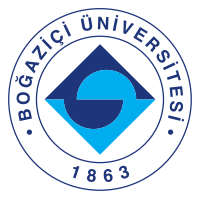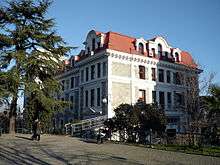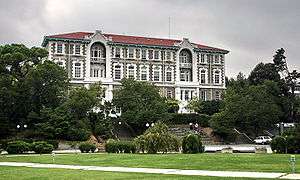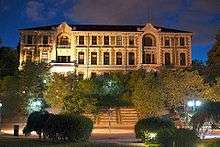Boğaziçi University
Boğaziçi University is a major research university located on the European side of the Bosphorus strait in Istanbul, Turkey. It has four faculties and two schools offering undergraduate degrees, and six institutes offering graduate degrees. The language of instruction is English.
Boğaziçi Üniversitesi | |
 | |
Former names | Robert College (1863-1970) |
|---|---|
| Type | Public |
| Established | 1863 |
| President | Mehmed Özkan[1] |
Administrative staff | 1,007[2] |
| Students | 16,517[3] |
| Undergraduates | 11,754[3] |
| Postgraduates | 4,763[3] |
| 847[3] | |
| Location | , |
| Campus | 6 campuses: total 1.699 square kilometres (420 acres)[3] |
| Language | English[4] |
| Colors | Light blue and dark blue |
| Affiliations | |
| Website | boun.edu.tr |
Founded in 1863, as Robert College, it is the first American higher education institution founded outside the United States. Though under entirely Turkish administration today, the university still maintains strong ties to the American educational system.
Boğaziçi University consistently ranks highest in Turkey, having the greatest number of applicants via the YGS-LYS Turkish university entrance examinations.[5] The well-known programs are electrical and electronics engineering,[6] computer engineering,[7] and industrial engineering.[8] Only the top 800 of the approximately 1.8 million participants in the annual Turkish university entrance examination (YGS-LYS) are admitted to register for these subjects at the University.[5] To be admitted into other degree programs, one usually has to be in the top 1% of the university entrance exam as well. This allows Boğaziçi University to attract many of the highest scoring students;[9] as well as having the most preferred applied science, education, engineering, and social science programs in Turkey.[10][11]
History


In 1863, Robert College was founded in the Bebek by Christopher Robert, a wealthy American philanthropist, and Cyrus Hamlin, a missionary devoted to education. Six years after its foundation, with the permission (Ottoman Turkish: irade) of the Ottoman Sultan, the first campus (the current-day South Campus) was built in Bebek at the ridge of the Rumelian Castle, very close to a Bektashi tekke, whose leaders maintained an excellent relationship with the Congregational and Presbyterian founders of Robert College, according to Dr. Friedrich Schrader, a German lecturer at Robert College during the 1890s.[12] The first building of the school was named "Hamlin Hall" in memory of Cyrus Hamlin. In 1878, Christopher Robert died. According to the article A Millionaire's Will, published in the New York Times (November 27, 1878), Robert left a great portion of his wealth to the College.[13]
A College Catalog was compiled in 1878–1879, giving general information and an outline of the courses of study. Defining the aims of the College the catalog stated: "The object of the College is to give to its students, without distinction of race or religion, a thorough educational equal in all respects to that obtained at a first-class American college and based upon the same general principles."
After Hamlin, Robert College was administrated by George Washburn (1877–1903)[14] and Caleb Gates (1903–1932). Though founded at the time of the Ottoman Empire as an institution of higher learning serving the Christian minorities of the Empire as well as foreigners living in Constantinople, the school adopted a strictly secular educational model in accordance with the republican principles of Turkey in 1923. Robert College, in the past had junior high school, high school, and university sections under the names Robert Academy, Robert Yüksek and American College for Girls. Since 1971, the current-day Robert College has functioned only as a "high school"[15] (more comparable to the French lycée in academic rigor) on its Arnavutköy campus (formerly the campus of American College for Girls), yet it retains the title of 'College'. The Bebek campus and academic staff were turned over to the Republic of Turkey for use as a public university named Boğaziçi University, the renamed continuation of Robert College's university section.
"Through the education of succeeding generations of students, Robert College has assisted the economic and social progress in the Near East. It has also brought direct benefits to several generations of Americans—faculty members, trustees, students, contributors, and other friends of the College. Their close association with the heroic and hospitable people of Turkey has led to a greater appreciation of Turkish life and culture and the strong foundations on which the Republic of Turkey, our close friend and partner in peace, has been built. I send my cordial congratulations to the officers and friends of Robert College on the century of service you are so deservedly celebrating."
— John F. Kennedy, President of the United States, Message for the Centennial Celebrations of Robert College, 1963[16]
_(1880-1910_y%C4%B1llar%C4%B1)_(LOC).jpg)
Campus

Boğaziçi University operates on six campuses in Istanbul. Four of these campuses (South Campus, North Campus, Hisar Campus, and Uçaksavar Campus) are close to each other and located on a hill in the affluent district of Bebek on the European side of Istanbul, overlooking the Bosphorus (hence the name). The Kennedy Lodge, named after John F. Kennedy, is located at the South Campus and operates as a welcoming facility for visiting professors and staff. The Kandilli Campus is right across from the shore, located on the Asian side of Istanbul (in Çengelköy) and hosts the Kandilli Observatory and Earthquake Research Institute (KOERI). The newest campus is in Kilyos on the Black Sea coast and is home to a private beach. The South Campus is the most popular campus among students and visitors alike. [17]
Dormitories

The University has ten dormitories on its different campuses. 1. Men's and 1. Women's Dorms are located on the South Campus and they are among the oldest buildings of the school. One other name of the 1. Men's Dorm building is Hamlin Hall and 1. Women's Dorm is also known by the name of Zeynep-Ayşe Birkan Women's Domitory. By accommodating at these two historical buildings, students get the chance of participating in the active social and historical life of Boğaziçi University. There are 4 dormitories on the North Campus. 1st and 2nd North Dormitories were opened to service after the year of 1985. While the former serves as a female dorm, the latter is for males. They have similar architectural designs. 3rd North Dorm was opened in the year of 2010 and currently it has been serving for female students. The last dorm of the North Campus is 4th North Dorm, which has been in service since 2011. Some of the electricity energy consumed in the dorm is being met thanks to its solar panels located on the roof of the building. On its Kilyos Campus, which is approximately one-hour away from the center, 1st and 3rd Kilyos Dormitories are located. 1st Kilyos Dorm serves to female students while the male students accommodate at the 3rd Kilyos Dorm. Opened to service in 2014, 3rd Kilyos Dorm building has a work and fitness room, laundry facilities, a computer lab, and a prayer room. Apart from those mentioned above, Superdorm and Kandilli Dorm also provide accommodation to Boğaziçi University students. Put into service in the 1998–99 academic year, Superdorm enables the students to socialize and experience the dorm life with higher service quality. As to the Kandilli Dorm, it was opened to service in the year of 2017 on the Kandilli Campus right across the Bosphorus. Only female students accommodate at the Kandilli Campus. The waste water collected from the bathroom is reused in the toilet reservoirs after the treatment process.
International rankings
| University rankings | |
|---|---|
| Global – Overall | |
| THE World[18] | 401–500 (2018) |
| USNWR Global[19] | 190 (2018) |
| QS World[20] | 571-580 (2019) |
Boğaziçi University was the only Turkish university among the first 100 universities worldwide according to the Times Higher Education World University Rankings of 2013–2014.[21]
Music Festival

Tasoda Festival is the most important amateur Music Festival that held in Turkey. Tasoda is the name of Music Club's studio. Tasoda Festival is organized by Bogazici University Music Club in every spring.[22]
Sport festivals
Every spring, at the end of May, international sports festivals are held at the South Campus and other venues of Boğaziçi University. Usually, around 300 to 800 students come from all over the world to participate in various tournaments.
Departments offering bachelor's degrees
Faculty of Arts and Sciences
- Chemistry
- History
- Linguistics
- Mathematics
- Molecular Biology and Genetics
- Philosophy
- Physics
- Psychology
- Sociology
- Translation and Interpreting Studies
- Turkish Language and Literature
- Western Languages and Literature (This department was formerly named English Language and Literature. In 2008, the content and courses were rearranged and the name was changed as well.)

Faculty of Economics and Administrative Sciences
- Economics
- Management
- Political Science and International Relations
Faculty of Education
- Computer Education and Educational Technology
- Educational Sciences
- Foreign Language Education
- Primary Education
- Secondary School Science and Mathematics Education
Faculty of Engineering
- Chemical Engineering
- Civil Engineering
- Computer Engineering
- Electrical and Electronic Engineering
- Industrial Engineering
- Mechanical Engineering
School of Applied Disciplines
- Management Information Systems
- International Trade
- Tourism Administration
The School of Foreign Languages
- Advanced English
- English Preparatory Division
- Modern Languages Unit
Institutes offering graduate programs
Graduate Studies in Sciences and Engineering
- Mechatronics (M.S.)
- Automotive Engineering (M.S.)
- Chemical Engineering (M.S., Ph.D.)
- Chemistry (M.S., Ph.D.)
- Civil Engineering (M.S., Ph.D.)
- Computational Science and Engineering (M.S.)
- Computer Engineering (M.S., Ph.D.)
- Electrical and Electronic Engineering (M.S., Ph.D.)
- Engineering & Technology Management (M.S.)
- Financial Engineering (M.S.)
- Industrial Engineering (M.S., Ph.D.)
- Mathematics (M.S., Ph.D.),
- Medical Systems and Informatics (M.S.)
- Mechanical Engineering (M.S., Ph.D.),
- Molecular Biology and Genetics (M.S., Ph.D.)
- Nuclear Engineering (M.S., Ph.D.),
- Physics (M.S., Ph.D.)
- Secondary School Science Education and Mathematics Education (M.S., Ph.D.)
- Software Engineering (M.S.)
- Systems and Control Engineering (M.S.)
Atatürk Institute for Modern Turkish History
Institute of Biomedical Engineering
Institute of Environmental Sciences
Kandilli Observatory and Earthquake Research Institute
- Earthquake Engineering
- Geodesy
- Geophysics
Graduate Studies in Social Sciences
- Arts in Conference Interpreting (M.A.)
- Business Information Systems (M.A.)
- Cognitive Science (M.A.)
- Media Studies (M.A. ,Ph.D.)
- Economics (M.A., Ph.D.)
- Economics and Finance (M.A.)
- Educational Sciences (M.A., Ph.D.)
- English Language Education (M.A., Ph.D.)
- English Literature (M.A., Ph.D.)
- European Studies (M.A.)
- Executive MBA – Department of Management
- History (M.A., Ph.D.)
- International Trade Management (M.A.)
- Linguistics (M.A., Ph.D.)
- Management (M.A., MBA, Ph.D.)
- Management Information Systems (M.A.)
- Philosophy (M.A., Ph.D.)
- Political Science and International Relations (M.A., Ph.D.)
- Psychology (M.A., Ph.D.)
- Sociology (M.A.) *Social Media Studies (M.A., Ph.D.)
- Translation (M.A.)
- Translation Studies (Ph.D.)
- Turkish Language and Literature (M.A., Ph.D.)
Vocational School of Hotel Management
- Tourism Administration Program (Secondary education)
Other Units
- Department of Fine Arts
- Department of Physical Education
Independent centers
Istanbul Center for Mathematical Sciences (IMBM) (South Campus)
Student clubs
- ADK (Kemalist Ideology Club)
- Aviation Club
- Ballet Club
- Ballroom Dancing Society
- Bridge Club
- BUDS (Bogazici University Debating Society)
- BUOK (Bogazici University Game Club)
- BULGBTİ (LGBT Studies Club)
- BUMATEK (Bogazici University Machinery and Technology Club)
- BUSAS (Bogazici Under Water Sports Club)
- BUSOS (Bogazici University Social Services)
- BUSUIK (Bogazici University Politics and International Relations Club)
- BUYAK (Bogazici University Operations Research Club)
- BUHAK (Bogazici University Air Club) (Paragliding)
- Chess Club
- Cinema Club
- IT Club (Compec[23])
- Construction Club
- Drama Club
- Education and Research Club
- Electro-Technology Club
- Engineering Society
- Environmental Society
- GSK (Fine Arts Club)
- BUFK (Folklore Club)
- Green Crescent Club
- Literature Society
- Mechanics and Technology Club[24]
- Management and Economics Club
- Mountaineering Club
- Music Club
- Operations Research Club
- Photography Club
- Radio Club
- Sailing Club
- Science Club
- Social Sciences Society
- Speleology Club
- Sports Committee[25]
- Translation Club
- Turkish Classical Music Club
- Village and Cooperatives Club
- Women's Studies Club
Notable alumni
- Erden Eruç - first solo human-powered circumnavigation and ocean rowing world record holder[26][27]
- Güler Sabancı – CEO, Sabancı Holding
- Gülse Birsel – author, screenwriter, actress, journalist
- Nevzat Aydın – CEO, founder, Yemeksepeti
- Nuri Bilge Ceylan – Film director winner of the Best Director Award at the Cannes Film Festival
- Tansu Çiller – Prime Minister, professor of economics
- Ahmet Davutoğlu – Prime Minister, professor of international relations, former Minister of Foreign Affairs
- Emre Gönensay – professor of economics, Minister of Foreign Affairs
- Engin Ardıç – Writer
- Cem Yılmaz – comedian, actor, cartoonist
- Erol Gelenbe—Honorary PhD (2004), Computer Scientist, Fellow of the French National Academy of Technologies and the Science Academy of Turkey, Foreign Fellow of the Royal Academy of Sciences of Belgium, Foreign Fellow of the Academy of Sciences of Hungary and Poland
- Aydemir Güler – Leader of the Communist Party of Turkey (TKP)
- Murat Gülsoy – writer
- Nil Karaibrahimgil – singer and composer
- Perihan Mağden – writer
- Fatma Ceren Necipoğlu – harpist
- Harun Tekin – rock musician, frontman of Mor ve Ötesi
- Teoman – singer and composer
- Murat Ülker - chairman of Yıldız Holding and Ülker[28]
- Ahmet Yalçınkaya – poet
- Ahmet Yildiz – biophysicist, University of California, Berkeley
- Derviş Zaim – film director
- Ezel Akay – film director
- Faruk Gul – professor, Princeton University, Department of Economics
- Mete Sozen – professor of structural engineering
- Jülide Ateş – 1990 Miss Turkey
- Neşe Erberk – 1983 Miss Turkey, 1984 Miss Europe
- Cem Boyner – CEO, Boyner Holding, former chairman of TUSIAD
Notable faculty
- John Freely – Professor of Physics, Author
- Kemal Kirişci – Professor of International Relations, Director of European Studies Center
- Şevket Pamuk – Professor of Economic History, Former President of European Historical Economics Society, brother of Nobel laureate Orhan Pamuk
- Selim Deringil – Professor of History
- Cahit Arf (1910–1997) Mathematician
- Cem Yıldırım – Professor of Mathematics
- Attila Aşkar – Professor of Mathematics, Rector of Koç University between 2001 and 2009
- Erdal İnönü – Former Deputy Prime Minister of Turkey, Former Dean, Professor Emeritus of Physics, Sabanci University, recipient of the Wigner Medal 2004
- Tansu Çiller – Former Prime Minister of Turkey
- Ersin Kalaycıoğlu – Professor of Political Science, Rector of Işık University since 2004
- Karl von Terzaghi – Civil engineer, known as the Father of Soil Mechanics
- Heath Lowry – Professor of History, Princeton University
- Aptullah Kuran – Professor of Art History, Student Dean, Robert College, First Rector of BU (deceased)
- Engin Arık – Professor of Physics
Rectors
- Cyrus Hamlin (1863-1877)
- George Washburn (1878-1903)
- Caleb F. Gates (1903-1932)
- Paul Monroe (1932-1935)
- Walter L. Wright Jr (1935-1943)
- Floyd H. Black (1944-1955)
- Duncans Balantine (1955-1961)
- Patrick Murphy Malin (1962-1965)
- Dwight James Simpson (1965-1967)
- John Scott Everton (1968-1971)
- Abdullah Kuran (1971–1979)
- Semih Tezcan (1979–1982)
- Ergün Toğrol (1982–1992)
- Üstün Ergüder (1992–2000)
- Sabih Tansal (2000–2004)
- Ayşe Soysal (2004–2008)
- Kadri Özçaldıran (2008–2012)
- Gülay Barbarosoğlu (2012-2016)
- Mehmed Özkan (2016–present)
See also
References
- Governance Boğaziçi University
- Statistics Boğaziçi University
- Sayılarla Boğaziçi Universitesi 2010 Boğaziçi University
- "The University". boun.edu.tr. Boğaziçi University. Retrieved 17 April 2017.
The language of instruction at BU is English
- 2019 YKS SONUÇLARINA GÖRE BOĞAZİÇİ ÜNİVERSİTESİ BÖLÜMLERİNİN TAVAN-TABAN PUANLARI VE SIRALAMALARI
- BOUN EE
- BOUN CmpE
- BOUN IE
- İlk 1000 Universielere göre dağılım Archived 31 March 2010 at the Wayback Machine Boğaziçi University
- Belgeler OSYM
- Huisman, Jeroen; Pausits, Attila (23 April 2019). Higher Education Management and Development. Compendium for Managers. Waxmann Verlag. ISBN 9783830972860 – via Google Books.
- Friedrich Schrader in: Robert College, Nord und Süd, November 1919, S. 165–169 (Article in German language)
- "Christopher Robert's Will" (PDF). The New York Times. 27 November 1878. Retrieved 22 January 2008.
- "George Washburn" (fee, via Fairfax County Public Library). Dictionary of American Biography. New York: Charles Scribner's Sons. 1936. GALE|BT2310001134. Retrieved 26 February 2012. Gale Biography In Context. (subscription required)
- "About Robert College". Archived from the original on 22 February 2012. Retrieved 7 February 2012.
- "Story of Robert College" (PDF). Archived from the original (PDF) on 20 June 2007. Retrieved 24 March 2007.
- Main campus Archived 21 March 2009 at the Wayback Machine Boğaziçi University
- "World University Rankings". Times Higher Education (THE). 18 August 2017.
- "U.S. News Education: Best Global Universities 2018".
- "QS World University Rankings 2019". Top Universities. 29 May 2018.
- World Rankins 2013 Times Higher Education
- http://www.bumk.boun.edu.tr/?page_id=89
- "Boğaziçi Üniversitesi Bilişim Kulübü - Compec". compec.org.
- "BUMATEK". bumatek.boun.edu.tr.
- "Boğaziçi Üniversitesi Spor Kurulu". Boğaziçi Üniversitesi Spor Kurulu.
- "Guinness World Records – First solo circumnavigation of the globe using human power". Guinness World Records. Archived from the original on 19 March 2016. Retrieved 16 January 2016.
- "Guinness World Records – First Person to Row Three Oceans". Guinness World Records. Archived from the original on 19 March 2016. Retrieved 8 December 2013.
- "Murat Ulker". Forbes. Retrieved 24 January 2015.
External links
![]()
- (in Turkish) Boğaziçi University home page
- (in English) Boğaziçi University main page